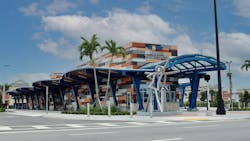Broward County Transit's Lauderhill Transit Center awarded LEEDv4 Transit Station Gold certification
The LEEDv4 Transit Station Gold certification has been awarded to the Lauderhill Transit Center, making it the first project in Florida and the entire United States to earn the Gold-level accolade. This recognition underscores the project's exceptional commitment to sustainable design, energy efficiency, and environmental stewardship.
The LEEDv4 Transit Station Gold certification was awarded for center's exemplary performance across various sustainability categories, including water and energy efficiency, indoor environmental quality, materials selection and transportation accessibility. This certification validates the project's adherence to the highest standards of green building practices and its positive impact on both the environment and the community it serves.
Spinnaker Group, a division of SOCOTEC, played a crucial role in this achievement, serving as the LEED consultants, commissioning agents and energy modelers for the Lauderhill Transit Center. Their expertise and dedication in implementing sustainable strategies have been instrumental in meeting the rigorous requirements set forth by the LEEDv4 certification.
Rafael Sánchez, director of sustainability at Spinnaker Group, expressed his delight in working with the entire project team.
"It has been an absolute pleasure collaborating with the exceptional project team on the Lauderhill Transit Center. Through integrative design and close collaboration, we were able to seamlessly integrate sustainability principles and achieve the LEEDv4 Transit Station Gold certification. This accomplishment exemplifies our collective commitment to building a greener future and creating sustainable transportation solutions for the community," Sanchez said.
Rafael noted that one of the unique features of this transit project that differs from other LEED building projects is the focus on intermodal connectivity to connect people and places while maximize utilization of public transportation and bicycle connectivity to the station. The station provides bus routes that are direct or make short route connections to the Ft. Lauderdale-Hollywood Airport, the Tri-Rail Station, and the Water Taxi in Ft. Lauderdale, Fla.
Broward County, owner of the Lauderhill Transit Center, recognized the importance of sustainable infrastructure and made a significant investment in developing a state-of-the-art facility that aligns with its environmental goals. Through their visionary leadership, Broward County Transit has provided a model for other transit centers to follow, ensuring a greener and more sustainable future for the region.
Saltz Michelson Architects, an architectural firm, contributed their expertise and creative vision to bring the Lauderhill Transit Center to life. Their design approach involved integrating functionality, aesthetics, and sustainable designs, to achieve results in a transit center that not only meets the needs of the community but also provides beauty and art.
Delta G, the MEP Engineers for the project, played a major role in ensuring the Lauderhill Transit Center's integration of mechanical, electrical and plumbing systems. Their innovative engineering solutions, focused on energy efficiency and sustainable practices, have contributed to the overall success of the project.
One of the center's notable features includes solar canopies strategically installed around the station and bus loading area. These solar canopies, including a solar array, harness clean, renewable energy from the sun and generate more than 100% of the building's energy needs. By effectively utilizing solar power, the Lauderhill Transit Center has achieved net positive energy, significantly reducing its carbon footprint and operating costs.
